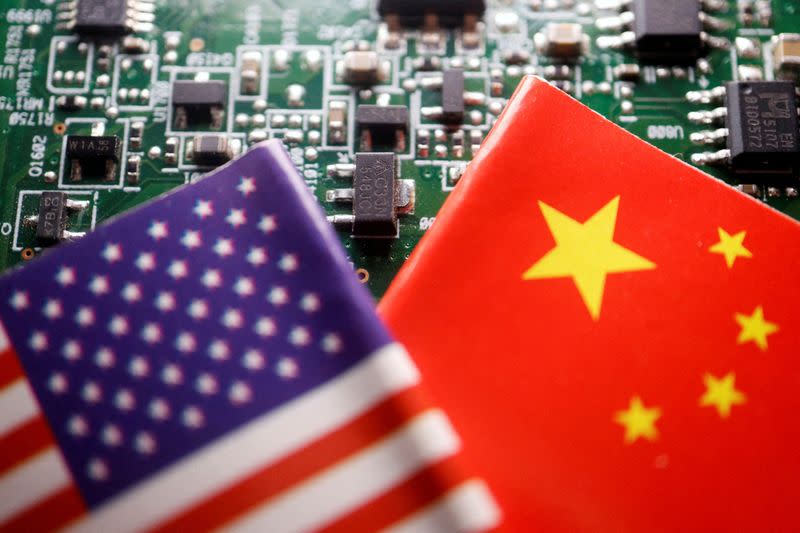China’s move to curb exports of two lesser-known metals widely used in computer chips could cause further disruption to global supply chains.
China’s commerce ministry said on Monday that from next month it would control exports of eight gallium products and six germanium products to protect its national security and interests.
The move – seen as a retaliation for escalating efforts by Washington to restrict Chinese access to high-end computer chips – ramps up the trade war with the US asa the metals are also used in electric vehicles and high-tech industries.
Companies are rushing to access impacts from the abrupt news. One US semiconductor wafer manufacturer quickly said it was applying for export permits to assure investors.
And a China-based germanium producer said enquiries from abroad and prices had surged overnight.
ALSO SEE: Treasury Secretary Yellen’s China Trip Aims to Steady Ties
Japan, Germany, France, Netherlands and US top importers
“China has hit the American trade restrictions where it hurts,” Peter Arkell, chairman of the Global Mining Association of China, said.
“Gallium and germanium are just a couple of the minor metals that are so important for the range of tech products and China is the dominant producer of most of these metals. It is a fantasy to suggest that another country can replace China in the short or even medium term,” Arkell said.
Gallium, germanium and other minor metals are widely used in wide-bandgap semiconductors in communication equipment, solar panels and electric vehicles.
China is the dominant producer of gallium and germanium. In 2022, top importers of China’s gallium products were Japan, Germany and the Netherlands, news website Caixin said, citing customs data. Top importers of germanium products were Japan, France, Germany and the United States, it said.
Export permits, disruption fears
US semiconductor wafer maker AXT Inc, which has manufacturing facilities in China, said on Monday its Chinese subsidiary Tongmei would immediately apply for permits to keep exporting gallium and germanium substrate products from China.
“We are actively pursuing the necessary permits and are working to minimize any potential disruption to our customers,” said AXT chief executive officer Morris Young.
A manager at a China-based germanium producer said his company had received several queries from buyers in Europe, Japan and the United States hoping to stockpile the product ahead of the export controls taking effect. The buyers were anticipating it could take as long as two months to obtain licence permits for exports.
“Offer prices in the domestic market and the export market have increased to 10,000 yuan ($1,380) per kg and over $1,500 per kg, respectively,” he said.
While the industry had expected to see some export controls for these metals, the timing had caught it by surprise, he said.
“Some downstream users have locked in long-terms sales contracts for the coming two to three years and they are vexed about a possible jump in raw material prices, as it raises their production costs and may cause them losses,” he said, declining to be named citing the sensitivity of the matter.
Risk of curbs on more rare earth elements
China’s controls come as Washington mulls new restrictions on the shipment of high-tech microchips to China, following a series of curbs in recent years.
The United States and the Netherlands are also expected to further restrict sales of chipmaking equipment to China’s chipmakers this summer, part of efforts to prevent their technology from being used by China’s military.
Beijing last made a retaliatory move against US pressure on chips in May, when it banned some domestic sectors from purchasing products from US memory chipmaker Micron.
Jefferies analysts said they saw the export controls as China’s second and much bigger countermeasure in the US-China tech war after the Micron ban, and also as a likely response to a potential US tightening of an AI chip ban.
“The risk of a rapid escalation of US-China tension is not small,” they said.
“If this action doesn’t change the US-China dynamics, more rare earth export controls should be expected.”
Chinese officials to meet producers on Thursday
Officials from China’s Ministry of Commerce will meet with major producers of gallium and germanium this week to discuss implementation of the upcoming export restrictions, according to four people familiar with the matter.
The meeting will take place in Beijing on Thursday July 6, according to three people, who declined to be identified because of the sensitivity of the topic.
China’s controls will apply to eight gallium-related products: gallium antimonide, gallium arsenide, gallium metal, gallium nitride, gallium oxide, gallium phosphide, gallium selenide and indium gallium arsenide.
They will also apply to six germanium products: germanium dioxide, germanium epitaxial growth substrate, germanium ingot, germanium metal, germanium tetrachloride and zinc germanium phosphide.
Exporters will need to go through procedures to obtain export licences, China’s commerce ministry said in a statement.
Anyone exporting these products without permission and those who export in excess of the permitted volumes will be punished, it said.
Germanium is also used in infrared technology, fibre optic cables and solar cells.
Taiwan, South Korea less concerned
Later on Tuesday, government officials in Taiwan and South Korea downplayed the risk of disruption from the curbs.
Taiwan Economy Minister Wang Mei-hua said the short-term impact would not be large, but they would pay attention to how the situation may play out in the long term.
South Korea’s industry ministry said in a statement the country had sufficient stockpiles of gallium, while there were other sources of germanium.
Shares in some metal producers rose on Tuesday, with Yunnan Lincang Xinyuan Germanium Industry Co jumping 10% by the daily upper limit, and Yunnan Chihong Zinc & Germanium Co climbing 7%.
Shares of Australian rare earths producers also rallied as investors placed bets that more curbs could be imposed. Shares in Lynas Rare Earths, the world’s largest producer of rare earths outside of China, rose 4%.
- Reuters with additional editing by Jim Pollard
NOTE: This report was updated with further details (on Thursday’s meeting and reactions from Taiwan and Korea) on July 4, 2023.
ALSO SEE:
Dutch Restrict Chip Exports Amid US Push to Tighten China Curbs
China Curbs Mean Permanent Loss of Opportunities for US: Nvidia
Chipmakers Shares Drop on Report of New US Chip Bans to China
US Risks ‘Enormous Damage’ With China Chip War: Nvidia CEO – FT
China’s Micron Ban Adds to Asian Chipmakers’ Investment Woes
US Looking to Ban Some Investment in Adversarial Nations – WSJ
























